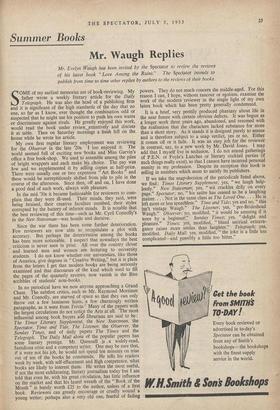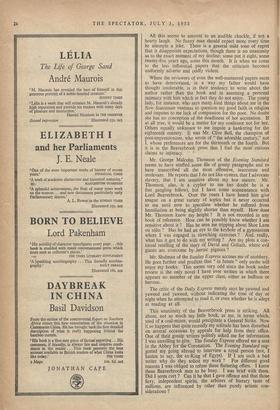Summer Books Mr. Waugh Replies
Mr. Evelyn Waugh has been invited by the Spectator to review the reviews of his latest book " Love Among the Ruins." The Spectator intends to publish from time to time other replies by authors to the reviews of their books.
SOME of my earliest memories are of book-reviewing. My father wrote a weekly literary article for the Daily Telegraph. He was also the head of a publishing firm and it is significant of the high standards of the day that no one, so far as I know, ever thought the combination odd or suspected that he might use his position to push his own wares or discriminate against rivals. He greatly enjoyed this work, would read the book under review attentively and discuss it at table. Then on Saturday mornings a hush fell on the house while he wrote his article.
My own first regular literary employment was reviewing for the Observer in the late '20s. I too enjoyed it. The world seemed full of exciting new books and Miss Garvin's office a free book-shop. We used to assemble among the piles of bright wrappers and each make his choice. The pay was low and we supplemented it by selling copies at half-price. There were usually one or two expensive " Art Books " and these would be surreptitiously shifted from pile to pile in the course of the afternoon. Since then, off and on, I have done a good deal of such work, always with pleasure.
In the mid '30s it became fashionable for reviewers to com- plain that they were ill-used. Their minds, they said, were being bruised, their creative faculties numbed, their styles corrupted by the battery of inferior minds. It is notable that the best reviewing of this time—such as Mr. Cyril Connolly's in the New Statesman—was hostile and derisive.
Since the war there has been some further deterioration. Few reviewers are now able to recapitulate a plot with accuracy. But perhaps the deterioration among the books has been more noticeable. I suspect that nowadays the best criticism is never seen in print. All over the country clever and learned men and women are lecturing to university students. I do not know whether our universities, like those of America, give degrees in " Creative Writing," but it is plain from the letters I get that modern books are being seriously examined and that discourses of the kind which used to fill the pages of the quarterly reviews, now vanish in the Biro scribbles of students' note-books.
In no periodical have we now anyone approaching a Grand Cham. The subtlest critics, such as Mr. Raymond Mortimer and Mr. Connolly, are starved of space so that they can only throw out a few luminous hints, a few charmingly written paragraphs, as it were from Trivia. Many of the papers with the largest circulations do not notice the Arts at all. The most influential among book buyers and librarians are said to be: The Times Literary Supplement, the New Statesman, the Spectator, Time and Tide, The Listener, the Observer, the Sunday Times, and of daily papers The Times and the Telegraph. The Daily Mail alone of the popular papers has some literary prestige. Mr. Quennell is . a widely-read, fastidious critic and a competent writer. One may be sure that, if it were not his job, he would not spend ten minutes on nine out of ten of the books he commends. He tells his readers week by week, with self-effacement and high competence, what books are likely to interest them. He writes the most useful, if not the most exhilarating, literary journalism today but I am told that even he, with his great circulation, has little influence on the market and that his laurel wreath of the " Book, of the Month " is barely worth £25 to the author, unless of a first book. Reviewers can greatly encourage or cruelly wound a young writer; perhaps also a very old one, fearful of failing powers. They do not much concern the middle-aged. For this reason I can, I hope, without rancour or egotism, examine the work of the modern reviewer in the single light of my own latest book which has been pretty generally condemned.
It is a brief, very prettily produced phantasy about life in the near future with certain obvious defects. It was begun as a longer work three years ago, abandoned, and resumed with the realisation that the characters lacked substance for more than a short story. As it stands it is designed purely to amuse and is therefore subject to a snap verdict, yes or no. Either it comes off or it fails. It was an easy job for the reviewer in contrast, say, to a new work by Mr. David Jones. I may add that I myself live in seclusion. I do not attend gatherings of P.E.N. or Foyle's Lunches or literary cocktail parties (if such things really exist), so that I cannot have incurred personal enmity in my profession. Despite its reception this book is selling in numbers which seem to satisfy its publishers.
If we take the snap-decision of the periodicals listed above, we find: Times Literary Supplement; yes, " we laugh help- lessly." New Statesman; yes, " wit crackles drily on every page. ' Spectator; no, " his satire has ceased to be a laughing matter.. .. Not in the same class as The Loved One. . . . He is left more or less speechless." Time and Tide; yes and no, " this isn't vintage Waugh." The Listener; yes, pre-Brideshead Waugh." Observer; no, modified, " it would be amusing if it were by a beginner." Sunday Times; yes, " delight and pleasure." Times; yes, modified, " bland satirical extrava- gance raises more smiles than laughter." Telegraph; yes, modified. Daily Mail; yes, modified, " the joke is a little too complicated—and possibly a little too bitter." All this seems to amount to an audible chuckle, if not a hearty laugh. No funny man should expect more every time he attempts a joke. There is a general mild tone of regret that it disappoints expectations, though there is no unanimity as to the exact moment of my decline; some put it eight, some twenty-five years ago, some this month. It is when we come to the less influential papers that the criticism becomes uniformly adverse and oddly violent.
Where the reviewers of even the well-mannered papers seem to have deteriorated, in a way my father would have thought intolerable, is in their tendency to write about the author rather than the book and in assuming a personal intimacy with him which in fact they do not enjoy. The young lady, for instance, who says many kind things about me in the New Statesman ventures to question my good faith in religion and imputes to me lack of compassion for the. poor. No doubt she has no conception of the deadliness of her accusation. If at all true, it would be a matter for my confessor not for her. 'Others equally unknown to me impute a hankering for the eighteenth century. It was Mr. Clive Bell, the champion of post-impressionism, who wrote of " the adorable century," not I, whose preferences are for the thirteenth or the fourth. But it is in the Beaverbrook press that I find the most curious claims to intimacy.
Mr. George Malcolm Thomson of the Evening Standard seems to have studied some file of gossip paragraphs and to have transcribed all the most offensive, inaccurate and irrelevant. He reports that I do not like oysters, that I advocate slavery, that I am sensitive about my low stature. Mr. Thomson, alas, is a cypher to me (no doubt he is a fine gangling fellow), but I have some acquaintance with Lord Beaverbrook. Over the years I have heard him give tongue on a great variety of topics but it never occurred to me until now to speculate whether he suffered from humiliation at being slightly shorter than myself. How does Mr. Thomson know my height ? It is not recorded in any book of reference. .How can he possibly know whether I am sensitive about it ? Has he seen me tripping about Shoe Lane on stilts ? Has he had an eye to the keyhole of a gymnasium where I was engaged in stretching exercises ? And, really, what has it got to do with my writing ? Are my plots a con- tinual retelling of the story of David and Goliath, where evil giants are overcome by heroic pigmies ?
Mr. Shulman of the Sunday Express accuses me of snobbery. He goes further and predicts that " in future " only snobs will enjoy my books. This seems very odd since the book under review is the only novel I have ever written in which there appears no member of the upper class, either as buffoon or heroine.
The critic of the Daily Express merely says he yawned and yawned and yawned, without indicating the time of day or night when he attempted to read it, or even whether he is adept at reading at all.
This unanimity of the Beaverbrook press is striking. All abuse, not sp much my little book, as me, in terms which. used of a coal-miner, would precipitate a General Strike. Now it so happens that quite recently my solitude has been disturbed on several occasions by appeals for help from their office. One of their gossip writers politely asked me for information I was unwilling to give. The Sunday Express offered me a seat in the Abbey for the Coronation. The Evening Standard sug- gested my going abroad -to interview a royal person (not, I hasten to say, the ex-King of Egypt). If I am such a bad writer why do they solicit my work ? For different good reasons I was obliged to refuse these flattering offers. I know these Beaverbrook men to be busy. I was brief with them. Did I seem curt ? Can it be that I gave offence and that those fiery, independent spirits, the arbiters of literary taste of millions, are influenced by other than purely artistic con- siderations ?



























































 Previous page
Previous page